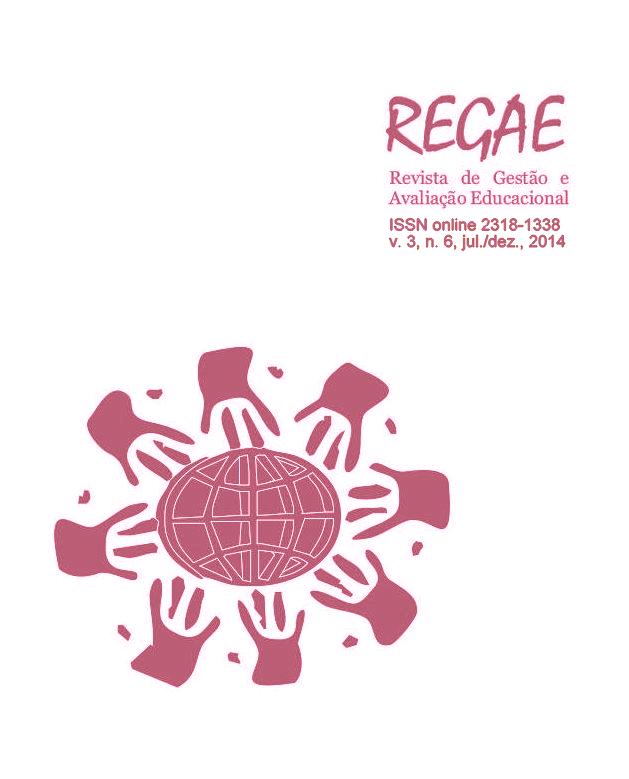Childood education in the unfolding of the process of inclusion: perspectives of teachers and management team
DOI:
https://doi.org/10.5902/2176217113824Abstract
We proposed to demonstrate and discuss how is the process of inclusion in early childhood education in a school in the city of Santa Maria, highlighting the look of the staff of the school regarding this process. To this end, were developed two types of questionnaires, one facing the teaching staff of the institution and the other to the management team. At the beginning of the work there is a resumption of the process of inclusion and the universe of Early Childhood Education. The examination of data from the questionnaires brings the necessity of reflection and of paramount importance beyond, assessing our daily practice and attitudes within the classroom.
Key-words: inclusion, early childhood education, public policies.
Downloads
References
BARBOSA, Maria Carmen Silveira; BANDEIRA, Larisa; GOBATTO, Carolina. Mapeando alguns desafios para as políticas públicas de educação infantil no Brasil. ESCOLA DE INVERNO, 6, 1998. Anais. Porto Alegre: UFRGS, 1998.
BRASIL. Constituição da República Federativa do Brasil. Brasília: Senado Federal, 1988.
BRASIL. Ministério da Educação e Cultura. Disponível em http://portal.mec.gov.br. Acesso em: 23 ago., 2011.
BRASIL. Lei das Diretrizes e Bases da Educação. Disponível em http://portal.mec.gov.br. Acesso em: 11 out., 2011.
BRASIL. Marcos político-legais da educação especial na perspectiva da educação inclusiva. Brasília: MEC, 2010.
CARVALHO, Francisco. Reflexões em torno da inclusão em contexto educativo. In: FREITAS, Soraia Napoleão (org.). Tendências contemporâneas de inclusão. Santa Maria: UFSM, 2008, p. 31-47.
COSTA, Dóris Anita Freire. Superando limites: a contribuição de Vygotsky para a Educação Especial. Revista Psicopedagogia, v. 23, n. 72, 2006, p. 232-240.
DUEK, Viviane Preichardt. Um olhar sobre a deficiência/diferença na escola inclusiva. Revista Educação Especial, n. 29, 2007, p. 33-44.
FREIRE, Paulo. Pedagogia da autonomia: saberes necessários à prática educativa. São Paulo: Paz e Terra, 2006.
GIL, Antônio Carlos. Métodos e técnicas de pesquisa social. São Paulo: Atlas, 1999.
KUHLMANN JR., Moisés. Infância e educação infantil: uma abordagem histórica. Porto Alegre: Mediação, 2004.
LÜCK, Heloísa. Concepções e processos democráticos de gestão educacional. Petropólis: Vozes, 2006.
LÜDKE, Menga; ANDRÉ, Marli. Pesquisa em educação: abordagens qualitativas. São Paulo: EPU, 1986.
MACÊDO, Janaína Amanda Sobral. Inclusão: a escola está preparada para ela? Portal R7, Brasil Escola, Meu artigo. Disponível em <http://meuartigo.brasilescola.com/ educacao/inclusao-escola-esta-preparada-para-ela.htm>. Acesso em 20 mar., 2012.
MATHIAS, Elaine Cristina Bio; PAULA, Sandra Nazareth de. A educação infantil no Brasil: avanços, desafios e políticas públicas. Revista Interfaces: ensino, pesquisa e extensão. ano 1, n. 1, 2009, p. 13-16.
OLIVEIRA, Zilma de Moraes. Creches: crianças, faz de conta & cia. Petrópolis: Vozes, 1992.
PASCHOAL, Jaqueline Delgado; MACHADO, Maria Cristina G. A história da educação infantil no Brasil: avanços, retrocessos e desafios dessa modalidade educacional. Revista HISTEDBR On-line, Campinas, n. 33, 2009, p. 78-95.
ROSA, Ângela Coronel da. Compreendendo o paradigma da inclusão. Revista Educação Especial, n. 29, 2007, p. 23-32.
UNESCO. Declaração mundial sobre educação para todos: satisfação das necessidades básicas de aprendizagem. Jomtien, 1990.
UNESCO. Educação para Todos: O compromisso de Dakar. Brasília: Unesco, Consed, Ação Educativa, 2001.
UNESCO. Declaração de Salamanca, 1994.
UNESCO. Enquadramento da Acção, 1994.
VYGOTSKY, Lev Semenovith. Fundamentos de Defectologia. Havana: Pueblo y Educácion, 1989.
Downloads
Published
How to Cite
Issue
Section
License
Authors keep copyright and concede to the magazine the right of first publication, with the work simultaneously licensed under the Creative Commons Attribution 4.0 International, non-commercial license with no derivative work, which allows to share the work with no author recognition and initial publication in this magazine.
Authors has authorization to overtake additional contracts separately, to distribute a non-exclusive version of the work published in this magazine: For example: to publish in an institutional repository or as a chapter of a book, with authorial recognition and initial publication in this magazine.
Authors are allowed and are encouraged to publish and distribute their work online. For example: in institutional repositories or in their own personal page – at any point before or during the editorial process, because this can result in productive changes, as well as increase the impact and the mention to the published work.






